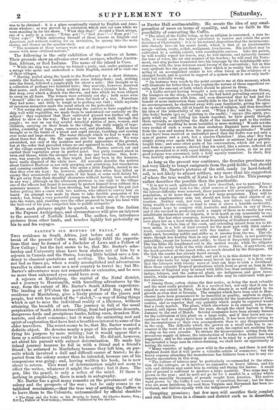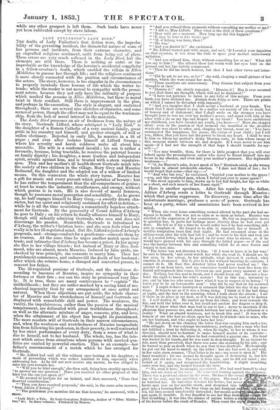BARTER'S SIX MONTHS IN NATAL. * This residence in South Africa,
just before and at the out- break of the present Caffre war, will hardly fulfil the expecta- tions that may be formed of a Bachelor of Laws and a Fellow of New College ; but the fact seems to be, that Mr. Barter's scho- larship and University ideas have been shaken out of him by a sojourn in Canada and the States, leaving little behind save a ten- dency to classical quotations and writing. The book, indeed, is not bad as times go, when a really accomplished and adventurous traveller is almost as rare as a new country to travel in; but Mr. Barter's adventures were not remarkable or extensive, and he sees no more than unlearned eyes could have seen. A sojourn at Maritzberg, the capital of the Natal district, and a journey to Harrismith, with travelling adventures by the way, form the extent of Mr. Barter's South African experience. The landing at D'Urban the port-town of Natal Bay, and the residence at Maritzberg, give a lively picture of the places and people, but with too much of the " sketch "—a way of doing things which is apt to miss the individual reality of a likeness, without attaining the breadth of art. The journey is full of the usual perplexities of South African travelling, from bad perilous descents, dangerous fords and precipitous banks, failing oxen, drunken Hot- tentots, and short commons ; but it wants the animating zest and spirit of exploration that have lent a breathless interest to some of the older travellers. The secret seems to be, that Mr. Barter wanted a definite object. He devotes nearly a page of his preface to mysti- fying his purpose by mere writing; but it would appear that a farm or a settlement was really in his head. He did not, however, set abut his pursuit with earnest determination. He made his inland journey because he fell in with a friend and a friend's friend ; he returned to Maritzberg because they left him, on pur- suits which involved a dull and difficult course of travel; he de- parted from the colony sooner than he intended, because one of his companions was going; and, having written his book, he is now about to return. This want of determination might not seem to affect the writer, whatever it might the settler; but it does. The pen, like the pencil, is only a reflex of the mind. If there is nothing in graphiology, there is much in autography. Mr. Barter has a good many remarks on the government of the colony and the prospects of the war ; but he only comes to es- tablished conchusions° —that the true way of settling the Caffres is to leave _them to the Colonists, untrammelled by official shackles
• The Dorp and the Veld; or Six Months in Natal. By Charles Barter, Esq., PellOW of Ne*College, Oxford. Published by Orr and Co.
or Exeter Hall sentimentality. He scouts the idea of any amal- gamation of races on terms of equality, and has no faith in the possibility of converting the Caffre.
" The mind of the Caffre being, as far as religion is concerned, a rasa ta- bells, it would seem the better calculated to receive and retain the great doctrines of Christianity : it is in his natural disposition that the insurmount- able obstacle lies—in his secret heart, which is that of an irreclaimable savage—sullen, crafty, selfish, malignant, treacherous. His intellect may be cultivated to a certain extent, with considerable success. Like the parrot, he will readily: repeat his lesson, nay, he will imitate, and naturally assume the tone of voice, the air and manner of his teacher ; he will read his Testa- ment, and sing psalms translated into his language by the indefatigable mis- sionaries2 with the true dolorous nasal twang of the conventicle ; but in this very aptitude lies the great danger ; that which is in reality but the clever acting of an accomplished mimic is too often taken as the evidence of a changed heart, and is quoted in support of a system which is not only ineffi- cient but radically wrong. "An instance very much to the point occurs to me at this moment, which will illustrate far better than I can explain the nature of those superficial re- sults, and the amount of faith which should be placed in them. "A Caffre servant having brought a note one evening to Balcony House, the loungers on the steep, according to the bad habit prevailing amongst us, fell into conversation with him, and soon discovered that he had had the benefit of more instruction than usually falls to the lot of his kind. Needing no encouragement, he chattered away with easy familiarity, giving his opin- ion on various subjects, till at length he spoke of religion, and thus described his idea of the immortality of the soul. 'When I die, said he, umzimba (the body) hamba (go) so,' (pointing to the earth); umoya (the spirit, pro- perly wind) so,' and folding his hands :together, he blew gently through them upwards, as signifying the flight of the immortal part to the realms above. Could anything be more beautiful or more striking ? Would not the very recital of such a scene in dear credulous England have drawn tears from the eyes and money from the purses of listening multitudes ? Would it not have been received as undoubted proof that the Caffre was not only a man of genius and a poet, but a sincere Christian? Alas, alas ! Boy was simply acting over again what his kind master or mistress had so prettily taught him ; and some other parts of his conversation, which did not pro- ceed from ao pure a source, showed that his mind, like a mirror, reflected all images presented to it with equal fidelity, and retained them, as far as any good purpose was concerned, with a hold equally transient. In short, Boy was, morally speaking, a decided scamp."
As long as the present wax continues, the frontier provinces are not very likely to tempt emigrants from the gold-fields; but should it cease, Mr. Barter's pictures of the arid, sandy (or hard-baked) soil, is not likely to attract settlers, any more than his suggestion of where the true wealth of Natal is to be looked for. This passage rather describes the possible than the practicable.
"It is not to such agriculture as I have described, nor to pastoral farm- ing, that Natal must look for the chief sources of her prosperity. Even if the labour-difficulty were removed, these pursuits will never support a dense population, or do more than enrich a few large proprietors. They will be useful as supplementary aids, but should not form the chief objects of at- traction. Neither corn, nor wool, nor hides, nor tallow, nor horses, Will bring wealth to the colony, or tend to raise it above a humble mediocrity. She cannot hope to compete with Australia and America in any of these, and if she succeed in producing such a supply of them as to render her own inhabitants independent of imports, it is as much as can reasonably be ex- pected. She has other resources, however, which if fully improved, would soon place her on a level with the most flourishing of Southern countries.
"Along the whole line of the coast, and extending inland from ten to fif- teen miles, is a belt of land covered for the most part with thick under- wood, occasionally interspersed with fine timber. The soil is chiefly a light sand, becoming redder and stiffer as it recedes from the sea. The cli- mate, though less healthy than in any other part of Natal, is not positively unhealthy, except for horses and cattle ; to these it frequently proves fatal. The boa hides his lengthened coil in the matted woods, while the alligator lurks in the sandy beds of the wide shallow rivers. Here, if anywhere, are the head-quarters of the insect tribe, so much dreaded by the European. Of the tick the reader has already heard enough. "This is not a promising sketch, and yet it is in this district that the ca- pitalist who looks for large returns must invest his money ; it is here only that the labourer with twenty acres of land can hope to earn a livelihood. Here those valuable Tropical productions which form so great an item in the commerce of England may be raised with little less than certainty. Cotton, indigo, tobacco, and the castor-oil plant, are indigenous and grow luxu- riantly, while experience has shown that coffee may be cultivated with per- fect success.
"Among these, cotton claims the first notice, as being the most valuable and the most easily produced. It is a received fact, not only that it can be raised to any extent in Natal, but that the climate is as well adapted to its growth as even that of Georgia. The samples which have been sent to Man- chester have been pronounced to be beautiful in quality, uniform in staple, remarkably clean and white, peculiarly suitable for the manufactures of Lan- cashire, and so superior that any quantity which alight be exported would find a ready market. The plant, which elsewhere is an annual' is here pe- rennial, and ripens throughout the year, though the chief harvest is from January to the end of March. Several companies have been already formed for the cultivation of this plant on a large scale, and if they have not suc- ceeded so well as might have been anticipated, it has been rather owing to the incompleteness of their own arrangements than to any disappointment in the crop. The difficulty which the grower on a small scale has to en- counter is the want of a purchaser on the spot, his capital not enabling him to ship on his own account. To obviate the inconvenience arising from the precarious supply of labour, the introduction of Coolies from India has been suggested ; and as the experiment is about to be tried by a gentleman who has invested a large sum in cotton-farming, we shall have an opportunity of testing its success.
"Many varieties of indigo grow wild in the colony, and there is not the slightest doubt that it will prove a valuable article of commerce ; but the heavy expense attending the manufacture has hitherto been a bar to any ex- tensive speculation in this drug.
"The culture of tobacco may be particularly recommended to the atten- tion of the cottager, as it involves no expensive or heavy labour, and his wife and children may assist hint in cutting and drying the leaves. A small plot of ground is sufficient to produce a large quantity. Two crops may be grown in the year ; and he need not go far for a market in a colony which imports annually thousands of pounds weight from America. The native weed grown by the Caffre I can warrant of excellent flavour • but for those who are more fastidious, the seed from Virginia and Havannah has been in- troduced, and thrives equally with the indigenous plant."
Tempting promises; but few men will sacrifice their bcomfort and risk their lives in a climate and district such as is described,
while any other prospect is left them. Such lands have never yet been cultivated except by slave labour.

































 Previous page
Previous page